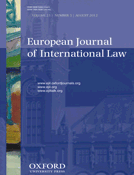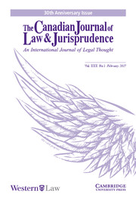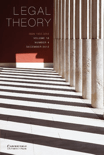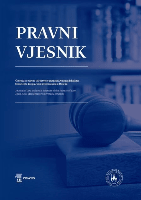
Ius Canonicum
Scope & Guideline
Advancing Scholarly Dialogue in Ecclesiastical Law.
Introduction
Aims and Scopes
- Canon Law and Human Rights:
Explores the relationship between canon law and fundamental human rights, emphasizing the rights of the faithful and the implications of legal frameworks in the Church. - Legal Frameworks in Religious Contexts:
Examines the interplay between canon law and other legal systems, particularly in the context of international law and human rights, to understand the broader implications of religious governance. - Judicial Processes and Legal Institutions:
Analyzes the functioning of ecclesiastical courts and tribunals, including the Apostolic Signatura and the Roman Rota, focusing on their roles in dispute resolution and legal adjudication within the Church. - Gender and Canonical Law:
Investigates issues of gender within the Church's legal structures, including the roles of women in ecclesiastical governance and the implications of gender equality in canon law. - Historical and Theological Perspectives:
Offers insights into the historical development of canon law and its theological underpinnings, providing a rich context for understanding current legal practices in the Church. - Societal Impacts of Canon Law:
Looks at how canon law interacts with contemporary societal issues, such as discrimination, religious freedom, and the impact of secular legal frameworks on ecclesiastical law.
Trending and Emerging
- Human Rights and Faith:
An increasing number of articles explore the intersection of canon law with human rights, indicating a growing recognition of the need for legal frameworks that protect individual rights within religious contexts. - Gender Equality in Church Governance:
Recent trends show a heightened focus on gender issues, particularly regarding the role of women in Church leadership and the implications of canon law on gender equality. - Ecclesiastical Law in Global Contexts:
There is a burgeoning interest in how canon law interacts with global legal standards, particularly in areas such as asylum, discrimination, and the rights of religious minorities. - Impact of Modernity on Canon Law:
Emerging themes reflect on the implications of modernity and postmodernity for canon law, examining how contemporary cultural shifts influence legal interpretations and practices within the Church. - Transparency and Accountability in Church Law:
A trend towards emphasizing transparency and accountability in ecclesiastical governance is evident, with increasing discussions on administrative practices and the legal responsibilities of Church officials.
Declining or Waning
- Historical Canon Law Studies:
While historical perspectives on canon law remain important, there has been a noticeable decrease in publications focusing solely on historical canon law, as contemporary applications and societal implications take precedence. - Canonical Sanctions and Punishments:
The focus on punitive aspects of canon law, particularly in relation to clerical misconduct, appears to be waning as the Church shifts towards more restorative approaches in addressing issues of abuse and misconduct. - Technical Legal Debates:
Discussions centered on the intricate technicalities of canon law, such as the specifics of legal codification processes, are becoming less frequent, possibly due to a growing emphasis on broader themes of justice and human rights.
Similar Journals

European Journal of International Law
Connecting scholars to pressing international legal issues.The European Journal of International Law (EJIL), published by Oxford University Press, stands as a leading platform for the dissemination of innovative research in the realms of International Law and Political Science. With an impressive ISSN of 0938-5428 and E-ISSN of 1464-3596, this prestigious journal has achieved Q1 rankings in both Law and Political Science and International Relations categories as of 2023, emphasizing its significance among contemporary scholarly publications. Spanning contributions from a diverse range of disciplines, the EJIL serves as an essential resource for researchers, professionals, and students alike, promoting critical dialogue on pressing international legal issues. Although currently not offered as an open-access journal, it continues to retain a high impact factor, as evidenced by its substantial Scopus rankings, placing it within the top percentiles in multiple categories. Its commitment to scholarly excellence is reflected in a convergence of research trends from 2005 to 2024, and it remains dedicated to fostering informed discourse on global legal frameworks and their implications.

Canadian Journal of Law and Jurisprudence
Bridging Historical Context with Contemporary ChallengesCanadian Journal of Law and Jurisprudence, published by Cambridge University Press, serves as a pivotal platform in the field of legal studies, particularly recognized for its comprehensive exploration of jurisprudence in the context of Canadian law. While the journal operates without an open access model, its ISSN 0841-8209 and E-ISSN 2056-4260 ensure broad academic accessibility. Based in the United Kingdom, it has established a notable impact within its category, maintaining a Q3 ranking in Law according to the latest 2023 metrics. With its convergence of issues from 1996 to 2003, periods in 2007, and recently from 2012 to 2024, the journal embraces a rich historical context while addressing contemporary legal challenges. Ranked #439 out of 1025 in the social sciences category on Scopus, the journal is positioned within the 57th percentile, highlighting its significance and influence in legal scholarship. Aimed at researchers, professionals, and students, the Canadian Journal of Law and Jurisprudence is an essential resource for those seeking to deepen their understanding of the evolving landscape of law and its philosophical underpinnings.

German Law Journal
Navigating the Complexities of Law in a Global ContextGerman Law Journal, published by Cambridge University Press, stands as a leading open-access platform for scholarly discourse in the field of law, having made its content freely available since 2019. With an impressive impact factor that places it in the Q1 category for Law as of 2023, and a robust Scopus ranking of #164 out of 1025 in the social sciences category, this journal is recognized for its high-quality research and significant contributions to legal scholarship. The journal encompasses a wide array of topics pertinent to the German legal system, European Union law, and comparative legal studies, thus catering to researchers, legal practitioners, and students alike. Located in the heart of the UK, at Edinburgh Building, Shaftesbury Rd, Cambridge, this journal not only fosters academic engagement but also promotes interdisciplinary dialogues that enrich the understanding of legal principles in an evolving global context. Emphasizing accessibility and high academic standards, the German Law Journal serves as an essential resource for those seeking to explore and contribute to contemporary legal discussions.

Melbourne University Law Review
Exploring Diverse Aspects of Legal ScholarshipMelbourne University Law Review, published by the MELBOURNE UNIV LAW REVIEW ASSOC, stands as a pivotal journal in the realm of legal scholarship in Australia and beyond. With an ISSN of 0025-8938 and an E-ISSN of 1839-3810, this esteemed publication has been a cornerstone for legal discourse since its inception. Designed to foster rigorous analysis and extensive debate, the journal covers diverse aspects of law, providing researchers, practitioners, and students an invaluable platform to engage with contemporary legal issues. The journal has demonstrated a commitment to high-quality scholarship, achieving a Q2 ranking in Law for 2023, further solidifying its importance within the academic community. Although not an open-access publication, the Melbourne University Law Review ensures that contributions remain accessible through institutional subscriptions, enhancing its reach and reinforcing its role as a critical resource for those dedicated to advancing legal knowledge and practice. For all stakeholders in the field of law—be they established academics or emerging professionals—this journal serves as a vital repository of innovative ideas and legal analysis.

Review of Central and East European Law
Bridging History and Law for a Comprehensive Legal PerspectiveThe Review of Central and East European Law, published by Martinus Nijhoff Publishers, stands as a pivotal academic journal dedicated to the legal developments and scholarly discourse in Central and Eastern Europe. With an ISSN of 0925-9880, this journal has been at the forefront of law and legal studies since its inception in 1975, becoming an essential resource for researchers, professionals, and students alike. The journal offers a rich interdisciplinary approach by integrating perspectives from classics, history, law, and philosophy, as evidenced by its classification across various quartile rankings. Specifically, it holds a prestigious Q2 ranking in Classics and is recognized within the upper echelons of History and Philosophy disciplines. With an accessible focus and insights into the evolving legal landscape, the Review of Central and East European Law continues to contribute significantly to understanding legal frameworks and practices in this dynamic region, ensuring its relevance in academic and professional circles.

Legal Theory
Unraveling the Complexities of Legal ThoughtLegal Theory, published by Cambridge University Press, stands as a significant academic journal dedicated to the exploration of the conceptual foundations and implications of law within the wider realm of philosophy. Established in 1995 and maintaining a consistent publication record through 2023, the journal has garnered a reputation for its high-quality scholarly contributions, reflected in its impressive rankings: Q2 in Law and Q1 in Philosophy as of 2023. With an impactful presence in the Scopus Ranks, Legal Theory is positioned 158th in Philosophy and 337th in Law, highlighting its relevance and influence—especially within the arts and humanities. This journal serves as a critical platform for researchers, professionals, and students who seek to engage with the intricate interplay between legal norms and philosophical inquiries. Though not open access, it offers a wealth of knowledge that is integral to advancing discourse in legal philosophy, making it an essential resource for those looking to deepen their understanding of contemporary legal theories and their implications.

Pravni Vjesnik
Empowering Legal Scholarship, Open to All.Pravni Vjesnik is a peer-reviewed academic journal published by the Pravni Fakultet Sveučilišta Josipa Jurja Strossmayera & Osijek, primarily focusing on the field of law within the social sciences. Since transitioning to an Open Access model in 2016, the journal has broadened its accessibility, allowing researchers, professionals, and students to engage with diverse legal scholarship without subscription barriers. With an ISSN of 0352-5317 and an E-ISSN of 1849-0840, Pravni Vjesnik plays a crucial role in disseminating knowledge and fostering discourse in the legal community, particularly within the context of the Croatian legal system and broader European legal frameworks. Although it holds a rank of #760 out of 1025 in the Scopus database, placing it in the 25th percentile of law journals, its commitment to quality and relevance ensures its importance as a resource for rigorous academic inquiry. The journal's scope is anticipated to expand from 2019 to 2024, promoting ongoing research in contemporary legal issues. This dedication to publishing comprehensive and impactful studies makes Pravni Vjesnik an essential platform for those involved in the legal field.

Revista de Estudos Constitucionais Hermeneutica e Teoria do Direito-RECHTD
Cultivating Knowledge in Constitutional FrameworksRevista de Estudos Constitucionais Hermeneutica e Teoria do Direito-RECHTD is a distinguished academic journal published by UNIV VALE DORIO SINOS (UNISINOS), focusing on the realms of constitutional studies, hermeneutics, and legal theory. Since its inception as an Open Access publication in 2009, it has provided a platform for rigorous scholarly discourse and innovative research in the legal field, particularly within the Brazilian context. With its E-ISSN 2175-2168, this journal aims to foster a deeper understanding of the constitutional framework and its implications in contemporary society. Despite its recent Q4 ranking in the Law category, RECHTD offers valuable insights and developments, making it a crucial resource for researchers, professionals, and students interested in legal studies, especially those investigating the nuances of hermeneutics and theory of law. Its impact on the academic community is set to grow as it continues to bridge gaps in legal scholarship and promote informed dialogue.

Ecclesiastical Law Journal
Cultivating Insight into Ecclesiastical Legal Traditions.The Ecclesiastical Law Journal, published by Cambridge University Press, serves as a crucial academic platform for the exploration and discourse of legal issues within ecclesiastical contexts. Since its inception in 1987, this journal has fostered an interdisciplinary dialogue, bridging the fields of law and religious studies with a keen focus on the implications of ecclesiastical law in contemporary society. Although it currently holds a Q4 category in both Law and Religious Studies for 2023, the journal's contributions are invaluable to researchers, practitioners, and students alike, seeking to understand the complexities of legal traditions interwoven with religious thought. With its commitment to rigorous scholarship, the Ecclesiastical Law Journal is a vital resource for those engaged in the academic study of law, theology, and their intersection, supporting the ongoing development of this essential area of inquiry.

Grotiana
Fostering Interdisciplinary Dialogue in History and LawGrotiana, a prestigious journal published by BRILL, stands as a vital resource for scholars and professionals engaged in the fields of History and Law. With its ISSN 0167-3831 and E-ISSN 1876-0759, this journal has been a beacon of academic inquiry since its inception, covering a diverse array of topics with an emphasis on legal history and historical jurisprudence. Grotiana holds a commendable impact within the academic community, reflected in its 2023 Scopus ranks indicating a 91st percentile in History and a 67th percentile in Law, underscoring its significance in interdisciplinary studies. Although not an open-access journal, it offers robust access options for institutions and individuals alike, facilitating research and knowledge dissemination. Scholars can benefit from its rich historical insights and rigorous legal analysis, contributing to the ongoing dialogue in these fields. With publishing cycles spanning from 1980 to 2024, Grotiana continues to uphold its commitment to excellence, making it a pivotal player for researchers, students, and professionals pursuing a deeper understanding of historical and legal frameworks.